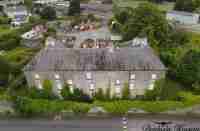In a recent address, Ireland’s Central Bank Governor outlined key priorities for the nation’s economic stability and growth, emphasising the development of infrastructure and a careful assessment of exchequer risks tied to the country’s tax base. These foundational focuses are seen as critical to ensuring Ireland remains competitive and resilient in an evolving global economy.
During the discussion, Ann Lanigan from Enterprise Ireland raised a pressing question about the role of immigration in addressing Ireland’s weakening labour force and aging population. She pointed to Japan as an example, a country that, despite facing a significantly aging population, has largely chosen not to rely on immigration to bolster its workforce. The Governor, Maklouf, responded with a clear stance: “Immigration is absolutely a part of life. Political leaders need to engage with a wider population. If you don’t replace your labour force you’ll be less productive and your living standards will lower.”
Maklouf staunchly opposes protectionist policies in Ireland’s financial system, instead advocating for an open-border strategy. He supports importing a labour force to address industry shortages, prioritising this approach over domestic solutions to meet Ireland’s economic challenges.
As Ireland confronts these interconnected priorities—investing in infrastructure, ensuring fiscal prudence, and revitalising its workforce and industries—immigration stands out as a critical component. However, Ireland’s asylum and international protection systems face scrutiny for their lack of local public consultation and unsustainable strain on resources, signalling a need for tighter controls and a shift away from profit-driven models. This approach demands not only strategic foresight but also widespread public buy-in to secure the nation’s economic future.
Date: February 20, 2025






